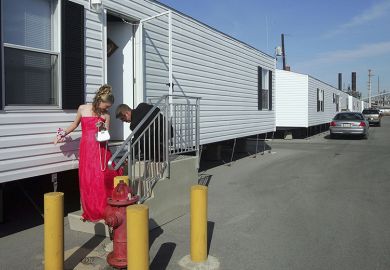Source: Getty
More into less? Teaching time for higher-level qualifications likely to shrink
University access work by further education colleges may be jeopardised by the extra workload imposed by new rules requiring teenagers to continue studying maths and English beyond the age of 16, an engineering body has warned.
Teenagers in post-16 education must now carry on with the subjects until the age of 18 if they fail to achieve at least Cs in maths and English at GCSE, a change introduced in September.
But there are concerns that the focus on bolstering numeracy and literacy skills among an extra 250,000 students a year will reduce colleges’ ability to teach higher-level qualifications that lead to university.
Matthew Harrison, director of engineering and education at the Royal Academy of Engineering, said that the supply of engineering students to universities could be affected by the requirements as colleges’ focus shifted to teaching the lower-level qualifications.
“We are piling on more demands, but we haven’t seen a corresponding increase in investment to help do these things,” he said. “If you are teaching an extra 200,000 or so students, further education could do with a massive injection of funds to do it.”
Professor Harrison said that teachers may struggle to give the necessary support to those thinking about studying engineering at university because of the extra burden.
“These students need close mentoring and personal support – all these things are likely to become a luxury when you have bigger workloads,” he said.
The issue was especially important because further education colleges had long been fertile recruitment ground for the engineering profession, Professor Harrison said.
Steps should be taken to increase the numbers studying the discipline from further education colleges because simply focusing on students with high A-level grades would not solve the UK’s chronic shortage of engineers, he added.
Only about 15,000 under-19s in further education achieved AS-level maths and about 8,000 gained A-level maths in 2010-11, far below the levels needed by the engineering profession, Professor Harrison said.
“Only recruiting from the top set is not enough,” he argued. “But it is a big ask for colleges to ramp up the number of students taking higher qualifications that lead to university when they are demanding they teach more functional skills.”
According to the Association of Colleges, an extra 2,100 teachers will be needed to deliver the additional courses. However, skills minister Matthew Hancock has claimed that “in most cases” the numbers were “in place” to teach them.
Register to continue
Why register?
- Registration is free and only takes a moment
- Once registered, you can read 3 articles a month
- Sign up for our newsletter
Subscribe
Or subscribe for unlimited access to:
- Unlimited access to news, views, insights & reviews
- Digital editions
- Digital access to THE’s university and college rankings analysis
Already registered or a current subscriber? Login





